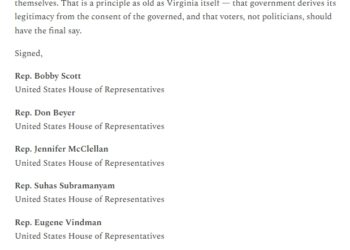It will be fascinating to watch the reaction of Republicans, many of whom support a proposed amendment to allow a supermajority of states to repeal federal laws, to this bill/constitutional amendment by Del. Scott Surovell (D-Mt. Vernon). According to Surovell, he doesn’t support the federal amendment because federal issues are different in a variety of ways, whereas localities in Virginia are in an “equal position to be able to make the decisions…” Many Republicans, on the other hand, argue that people are governed best at the most local level possible, which is part of their rationale for allowing states to override federal legislation. Given that philosophical underpinning, what would be their rationale for opposing the same thing at the state/local level? Anyway, I can’t wait to watch this debate! 🙂
P.S. I crunched the numbers, and as far as I can tell, it will be very difficult for either Democrats or Republicans to muster 2/3 of localities by population for just about anything. So, I’m not sure what practical impact Surovell’s proposal would have.
UPDATE: A statement from Del. Surovell is on the “flip.”
Delegate Scott Surovell spoke today regarding his introduction of House Joint Resolution 604. The resolution calls for a constitutional amendment which would authorize counties and cities which contain at least two thirds of the Commonwealths population to repeal state legislation. The amendment is similar to the proposed Federal “repeal amendment” which would grant similar power to state legislatures to repeal Federal legislation.
Surovell introduced the amendment in response to House Joint Resolution 542, introduced by Delegate Jim LeMunyon. “It’s a check on power and what Delegate Jim LeMunyon and the speaker proposed in the amendment I think opens an interesting discussion. I think it’s a discussion we ought to have at the state level” said Surovell in an interview with Ryan Nobles of WWBT in Richmond.
Surovell was quick to point out that the General Assembly has passed along more and more unfunded mandates to localities, while limiting options for increasing local revenue. Additionally, the localities pass their revenue to the Commonwealth for reallocation throughout Virginia. “Richmond has used local governments as a source of funding with little regard to the impact on the cities and counties,” Surovell said. “We require state fiscal impact statements to be attached to legislation, but no accounting of the impact to localities.”
Surovell further noted that an amendment to the Commonwealths constitution avoids many of the problems he sees the federal amendment having. “Unlike Congress, the General Assembly doesn’t handle national security or foreign policy. Local government and the General Assembly have access to the same information; we just have different areas of responsibility.”
Special interests are likely to oppose such a repeal amendment. Surovell pointed out that in a
Dillon Rule state, special interest only need to lobby the 140 members of the General Assembly. “I think this amendment would cut down on the influence of special interests, as it would require lobbyists to deal with local government in addition to state legislators.”Surovell doubts the amendment’s repeal process would be open to abuse. “Under this amendment, repealing legislation passed in Richmond wouldn’t be easy. You’d need to build a real coalition of localities and no one region could dominate the process.” Surovell anticipated that the amendment would only come into play in the case of particularly egregious state legislation. “5.3 million Virginians won’t mobilize over something that’s not actually a real problem for local governments.”
HJ 604 will come before the Constitutional law subcommittee of the House Committee on
Privileges & Elections. Surovell was hopeful that the resolution would provoke discussion amongst his colleagues. “Regardless of how the resolution fares, I think this is the start of an important discussion on the relationship between Richmond and local governments.”

![[UPDATED with Official Announcement] Audio: VA Del. Dan Helmer Says He’s Running for Congress in the Newly Drawn VA07, Has “the endorsement of 40 [House of Delegates] colleagues”](https://bluevirginia.us/wp-content/uploads/2026/02/helmermontage.jpg)
















